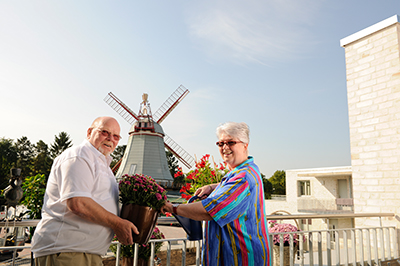Basierend auf einer integrierten Repräsentation sensorischer Features und Motoraktionen (SFB TR 8 Spatial Cognition / A5-[ActionSpace])
Unser Ziel ist die Entwicklung einer hierarchischen sensomotorischen Repräsentation und ihrer Anwendung in einem biologieinspirierten System zur Selbstlokalisierung und räumlichen Navigation. Die sensomotorische Repräsentation ist motiviert durch den menschlichen Aktionswahrnehmungszyklus und dessen Zusammenspiel mit der Verarbeitung sensorischer Informationen und zielgerichteter Motorik.
The project, which is funded by the Federal Institute for Research on Building, Urban Affairs and Spatial Development (BBSR) was a cooperation of the Institute of Cognitve Neuroinformatics, the Bremer Heimstiftung, the Bremer Kontor GmbH, and FORUM Huebner, Karsten & Partner.

The project, which is funded by the Federal Institute for Research on Building, Urban Affairs and Spatial Development (BBSR) was a cooperation of the Institute of Cognitve Neuroinformatics, the Bremer Heimstiftung, the Bremer Kontor GmbH, and FORUM Huebner, Karsten & Partner.
A subgoal of the project was the development of an autonomous fall-detection system for bathrooms. The developed system monitors the bathroom using two types of sensors, performs data-fusion and evaluates the combined data in real-time. If a fall is detected, the system makes an emergency call using the in-house emergency system.
During the project lifetime the system was developed and prototypically installed into four apartments in the "Village Arbergen“.
The goal of SHARE-it is to develop a scalable, adaptive system of add-ons to sensor and assistive technology so that they can be modularly integrated into an intelligent home environment to enhance the individual's autonomy.
The goal of SHARE-it is to develop a scalable, adaptive system of add-ons to sensor and assistive technology so that they can be modularly integrated into an intelligent home environment to enhance the individual's autonomy.
The system will be designed to inform and assist the user and his/her caregivers through monitoring and mobility help. Thus, we plan to contribute to the development of the next generation of assistive devices for older persons or people with disabilities so that they can be self-dependent as long as possible. We focus on add-ons to be compatible with existing technologies and to achieve an easier integration into existing systems.
We also aim at adaptive systems as transparent, and consequently, easy to use to the person as possible. Scalability is meant to include or remove devices from the system in a simple, intuitive way. At Universität Bremen, the work in SHARE-it concentrates on the development of an adaptive biosensor-based cognitive assistance module and a cognitive performance model as a basis for interaction models tailored to individual users' requirements

We have 39 guests and no members online